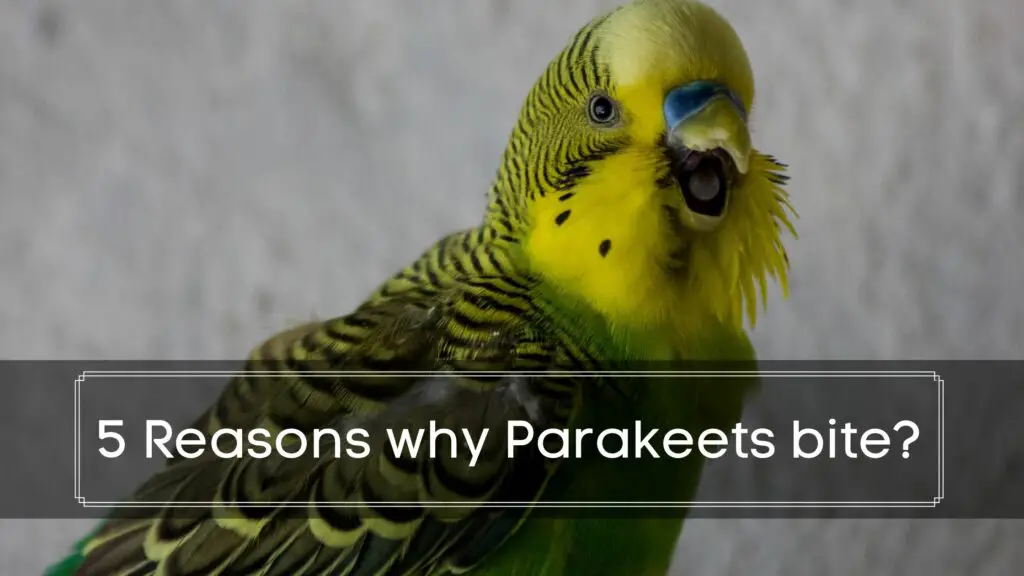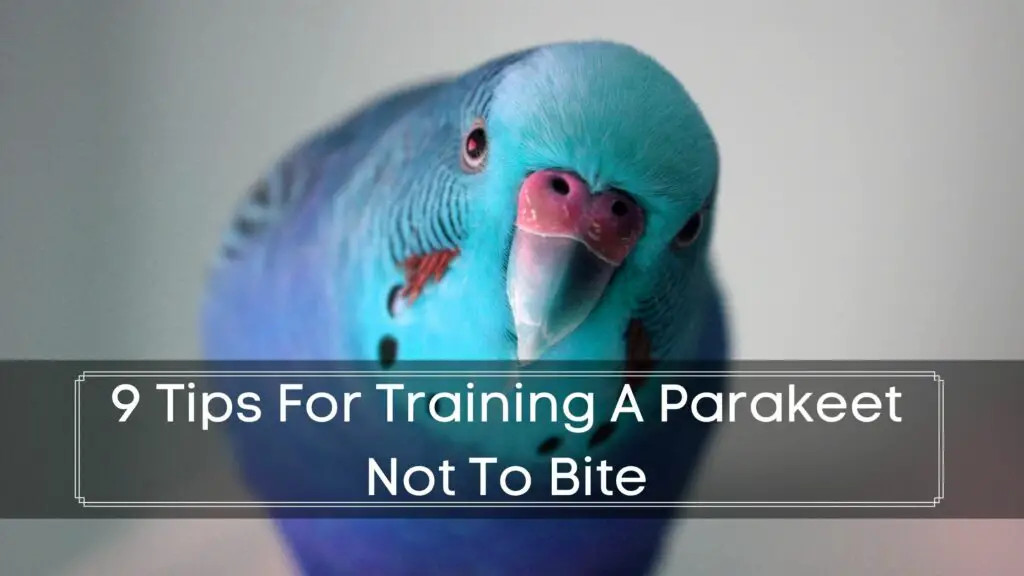
It is more crucial to teach your pet to stay to get rid of the biting habit as quickly as possible if you have to host guests or kids. Do Parakeets bite? If yes, why do they bite? How To Train A Parakeet To Not Bite? These issues have been answered to assist you when it comes to training your bird not to bite or nip.
Being bit by a parakeet is one of the worst aspects of being bird-loving. Through various studies, we have discovered that certain birds are more susceptible to bites than others.
Do Parakeets bite?
Parakeets are renowned for their habit of nipping and other similar behaviors, making them a very frequent bitter. It’s very typical that parakeets nip and bite when bored or to play, as it’s a fun behavior and a fun game between siblings in a barricade. The young ones don’t just nip for self-defense; it may indicate affection and bonding.
However, receiving a bite from an adult parakeet won’t cause it to be acceptable to everyone. Do you know the reason behind my parakeets bit me?
5 Reasons why Parakeets bite?

The first step in solving your parakeet bite problem is determining the root cause behind this behavior. Once you have identified the reason for the conduct, you can identify what you can do to reduce the behavior.
A parakeet bite could be for many reasons, and not everyone is unreasonable. Biting and nipping frequently could be their method of communicating with you. It is, however, always beneficial to stop the biting behavior of a parakeet. Let’s look at some suggestions to help you comprehend why they might bite you.
Baby & Young Parakeets Behave differently to adult ones.
Most often, young parakeets bite and nip each other during play. Like children, young birds are usually more excited and more susceptible to bite since they aren’t aware of the rules.
Importantly, you must remember that older parakeets are more stubborn when not adequately trained. It can also take longer to teach an adult parakeet not to bite than a baby.
Parakeets bite to tell you to put them down.
If they’re constantly biting while you are holding them, it could be a method of telling that you should put them down. Do not be concerned because it’s not necessarily a sign you’re harming them.
Sometimes, parakeets are as likely to say”let me go” as they want to play or feel bored. Being aware of this type of communication is necessary to better your relationship with them.
Additionally, Parakeets bite when they are picked up by a stranger or are wounded. Be sure that you handle your pet with care.
Parakeets May Be Biting As A Form Of Communication.
Nips and bites are thought to be a typical way of communicating between birds, including parakeets. You may have seen parakeets who bite their sibling to communicate or alert them to something like “get away from me” or “let’s play.”
Parakeets may also be extending this kind of behavior to you. You must ensure that you pay attention to them and pay the time. Also, you should teach your pet a different or more effective method of communicating with you.
Parakeets might not have a pleasant encounter with humans.
Adult parakeets recently adopted from a pet shop often bite. Probably, their previous owners didn’t manage the birds. It is essential to work and teach young birds to make them well-behaved equine from an early age.
Another reason is that your pet is becoming averse to humans because of neglect. If you’re training a parakeet who is afraid or anxious, Try disciplinary techniques.
Your Parakeet is hungry.
Adult parakeets with an excellent bond with their owners can bite them when they’re hungry. The Parakeet is trying to let you know that they are hungry. If the bowl that feeds your cage seems empty, replenish it.
It is always beneficial to offer food; however, don’t do it repeatedly because it could make them more likely to eat more food.
The fear of being afraid requires patience and coziness.
Games that require discipline.
Communication that requires redirection.
Ferret Bites
How do you train a parakeet not to bite?
This article will examine ways to make your pet less likely to bite. Based on why your parakeet bites or snorts, the technique will change. That’s why here are three ways to teach your dog not to bite.
3 Methods On Training A Parakeet to Not Bite
Training a fearful or anxious Parakeet
If your pet is scared, you need to build confidence between the bird and you. To train your Parakeet successfully, try keeping the session brief initially and then gradually making it to a longer duration.
Do not push them too much, and always conclude them with an excellent note. Also, it would help if you didn’t try to manage them. If they appear anxious or want to be free, It is best to avoid imposing on them to behave in a certain way.
Instead, allow them to become at ease around you. Reward their calm behavior with treats but do not punish them since a parakeet that bites will always interpret an act of punishment as proof that humans are not good. Positive reinforcement is more effective.
If you own a parakeet that hasn’t been handled yet, you can begin feeding it directly from your hands. This will allow your bird to be close to you. When you see them at ease with you, it is possible to try manipulating them without the worry of being bitten.
A parakeet that has never had skin contact with fur can bite. This method is usually adequate for these birds that are afraid of humans.
- Interesting Further Reading
- Can Parakeets Tolerate Heat? If So, How Much?
- All About Parakeets Making Noise & Sounds
- Can Parakeets Live Alone? + Do Parakeets Need a Companion
- All About: Parakeets Breeding Behaviour!
Training A Parakeet A Different Way To Connect With You
If your parakeet is a biter who communicates, there are two significant steps to deal with. First, you need to take the time to learn what they’re trying to convey to you. Sometimes, a parakeet will bite or nibble after you’ve ignored a lot of their other signals.
When they observe this happening often, they will learn to bite because it’s the fastest way to grab your attention. If they bite and pay attention to them, it can be sticky like gum. The first step in stopping bites is to avoid occurring in the first instance.
Be attentive to the behavior of your Parakeet’s communication and other signs. Pay attention before they start nibbling or biting you. When your pets develop this behavior, consider conserving them or redirecting them with similar strategies.
Do not reward your pet for bites by doing things they require or desire. Please do not take them off immediately after they’ve been bit. Also, this means that you must avoid watching the bites they make when they are on yours.
Instead, it would help if you disciplined them. Make sure to encourage them to become calm, or employ other methods to draw your focus.
Training a Parakeet Who Bites As a Part of Play
Parakeet bites as part of the game. To train parakeets, you must have strict discipline. The best way to introduce this type of bird you must act with aplomb and make sure you’re making it clear that biting is not a good idea.
The best method to do this is to stop the time spent playing with your pet when a bite occurs. When your pet is bitten, put them down and get them out of the way. Doing nothing to your pet is another method to let them know that they cannot behave in a certain way.
In addition, you should encourage their calm behavior and offer lots of praise to demonstrate what behavior is acceptable and desirable.
9 Tips For Training A Parakeet Not To Bite

Avoid Yelling At Your Parakeet.
The sound of shouting can be a negative experience for a parakeet and eventually prevent them from trusting you. A shout or yell at a parakeet can freak them away.
If you’ve thought about screaming at a pet, I’ll warn you: it can cause them to begin biting you more frequently than they have ever. Try to remain at peace and remain gentle.
Be consistent.
If you’re considering the training of a parakeet that is fearful, it’ll take longer than a bird who trusts you. Every Parakeet has its unique character and requires stability to learn.
Be sure not to try to transmit too many messages at once. Do not mix letters as it can confuse the bird’s ability to process. Make sure your routine for your bird is solid.
Discipline Your Parakeet.
When you begin to train your pet, be aware of their stubbornness. If you’re new to owning a parakeet, you might be amazed by how long it takes to teach one. Adult Parakeets require more time than younger ones.
Suppose we believe that you’re doing your training correctly and making very little or no error. You can expect to have your Parakeet stop biting in the next 3-12 weeks. The movement of an adult parakeet not to bite could take months.
Fill their Food Bowl.
Parakeets usually eat when hungry. If their food bowls are empty, refilling it will help. In most cases, parakeets take a bite to let their owners know that they’re hungry.
Never Hurt Your Parakeet.
It is important to avoid harming your pet in any situation. Accidents can put the training back for an extended period. You must be aware of any injury or accident to create trust and build a stronger bond during all of your training sessions.
Always Give Your Parakeet A Timeout.
Another method to discipline a Parakeet is to place the animal in a separate cage for five minutes. This can help them understand that the behavior they had previously displayed wasn’t accepted and incorrect.
Be sure to keep your pet in the cage for more than five minutes because it will make them more relaxed. Your Parakeet might even sleep. In the worst case, being there for longer than five minutes could positively connect the Parakeet’s bite and nap time.
Scruffing A Parakeet.
Like dogs and cats, You can also secure your pet using the loose skin on their necks without hurting them. If you take a look and carefully grab the area to secure them, you’ll stay out of the way of bites.
Redirection.
The third and final option is to change your bird’s biting behavior to more appropriate things. You should purchase chew toys such as this made for bites by birds to accomplish this.
Bitter Tasting Spray.
Bitter-tasting sprays such as lemon and apple are readily available that you can spray to stop your Bird bite behavior. This should not be applied to your pet’s Parakeet. Instead, you should spread around the area or objects they may bite.
Summary
Parakeets may bite for numerous reasons, which might not be unjustifiable. You must determine the cause behind these bites to teach your Parakeet not to bite. Then, redirect their biting behavior using DIY chewable toys.
Preventive measures are the most effective method; therefore, be attentive to the other signals your bird is sending you, as they will often bite if you ignore the other signs.
They also bite you when they’re hungry or want your attention. If they’re hungry, they should refill their food bowl. If they’re trying to bite you to attract your attention, do not bother them initially. Do not shout at or scratch your bird.

Hi, There and Welcome to BirdsNews.com, is here to help you learn and care about pet birds. and this blog is a journal of everything I’ve learned.
